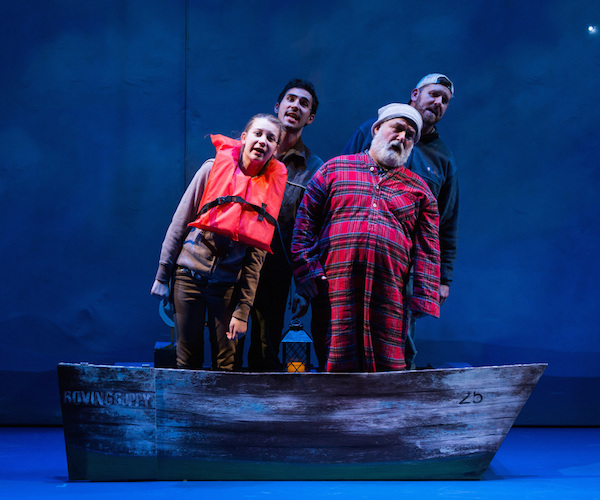Fuse Theater Review: “Lobster Girl” — A Heartfelt Musical Sea Yarn
Lobster Girl presents us with an idyllic vision of Cape Ann, Massachusetts: blue and pink skies, shining water, a picturesque seagull.
Lobster Girl by Weylin Symes, music and lyrics by Steven Barkhimer. Directed by Weylin Symes. Presented at the Stoneham Theatre, Stoneham, MA through June 26.

Brigit Smith, William Gardiner, Felix Teich, and Bryan Donovan in the Stoneham Theatre production of “Lobster Girl.” Photo: Nile Scott Shots/Nile Hawver.
By Jess Viator
Lobster Girl is an intimate and sweet concoction, set on a watercolor lobster boat framed against a Crayola-blue sky dotted with cotton-ball clouds. The childlike simplicity of the set reflects the basic storyline; it is a straightforward (if predictable and a bit trite) yarn about a would-be stepdad trying to connect with his fiancée’s daughter. He takes her out on his lobster boat for a day of pulling traps: he is nervous and babbling; she is sullen and reticent. Eventually they warm up to each other and form a bond. Much of this is close to your average TV drama. The characters are realistically drawn, with playwright Weylin Symes and composer/lyricist Steven Barkhimer spending much of their energy exploring emotional arcs. What makes this piece distinctive as theater is its playful use of visuals.
Symes and Barkhimer present us with an idyllic vision of Cape Ann, Massachusetts: blue and pink skies, shining water, a picturesque seagull. We meet Ol’ Joe, a genial old salt straight out of a Winslow Homer painting. The guy perches on a 5-gallon bucket at the edge of the dock, surrounded by Mylar water. He cheerfully greets us, folds up his Gloucester Times, and launches into a rollicking and ribald hornpipe about his plain but satisfying life at sea. He is accompanied by an acoustic guitar and a fiddle. The number invokes a traditional sea shanty, but it comes with plenty of modern flair — it is twee, but self-aware, and William Gardiner’s performance is charming enough to make it work.
Enter Hank, the high-strung protagonist of Lobster Girl. He is anxious and frantic, waiting for his girlfriend and her young teen daughter. In his opening scenes, Bryan Donovan’s Hank is charismatically goofy, but his jitteriness is cranked up to 11. His frenzied, joking chatter shows us how nervous he is about this day devoted to bonding with his soon-to-be stepdaughter. This nervous tick is brought out a multiple times in the script; it is clearly meant to convey awkwardness, but it is overdone. The other performers are working on a much subtler track of heightened realism. Donovan eventually dials back on the hyper-nervousness and provides an earnest portrait of a middle-aged man clumsily grasping at a way to connect with this girl, who seems to be far outside of his realm of understanding.
Young Cora’s transition from self-consciousness to eager vibrancy is much smoother. It is a delight to watch. Brigit Smith’s performance as Cora is (to this formerly awkward teen girl) genuine and deeply touching. Both Cora and Hank independently testify — in sung soliloquy — to how much they want to be liked by the other, and what an impossible task that seems to be. A tip of the hat to both Smith’s acting and Barkhimer’s lyrics — Cora’s lament “you can’t be more awkward than me” cut straight to my heart.
The third wheel on this boat is Hank’s sternman, Jake, deftly played by Felix Teich. The character takes on role of mediator between father and daughter, engaging with Cora on a level that Hank is too keyed up to manage. Jake has an easy, friendly manner (and is young and handsome to boot); soon he and Cora are pals. The two lobstermen walk Cora through gaffing the buoys and hauling the traps. But, while filling bait bags, Cora and Jake establish a rapport that makes Hank jealous. Together, the two dream up an elaborate superhero story, and it generates the best musical number of the show, “Lobstergirl and Professor Sharktopus.” Here Smith and Teich are given an opportunity to be utterly uninhibited and silly (Teich’s wiggly dance as Mackerel Boy had me in hysterics). Donovan’s Hank reacts with a convincingly honest dismay.

(l to r) Cait Zweil, Brigit Smith, William Gardiner, Felix Teich, and Bryan Donovan in the Stoneham Theatre production of “Lobster Girl.” Photo: Nile Scott Shots/Nile Hawver.
I love the central conceit of the show. Nearly all of the play takes place on a boat, where the characters have to engage with each other, need to immediately deal with thorny problems and emotions. Although Katy Monthei’s design of the lobster boat is impressive (whimsical, yet accurate!), the set up restricts the performers considerably. Here Symes’ versatility as a director asserts itself; the diminished playing area is used to the drama’s advantage. He manages to isolate characters when necessary, yet he throws them off-kilter or gives them elbow room when called for. The stage movements and postures always look artful; the actors never seem gawky or uncomfortable (except when thematically appropriate) in this unwieldy space.
I also appreciate Symes’ dedication to accurately depicting a commercial lobster boat. This play has been well researched, and Symes takes pains to teach the audience, via the proxy of Hank teaching Cora, the work of lobstering. Because my family is from Cape Ann, I delighted in the references to Thatcher’s Island and The Breakwater. I only have second-hand knowledge but, for me, the Cape Ann fishing industry is about working-class gruffness, North Shore accents, backbreaking labor, and the stench of dead fish. In contrast, Symes has created a pastoral seascape that sanitizes much of that reality — but he treats the character of Hank and his livelihood with such affectionate respect that the sugar-coating doesn’t rankle. And any fisherman I know would rather have this story evoke (as Symes does) the bucolic exhilaration of fishing — the breathtaking beauty of the sea and the thrill of being on the open water.
Barkhimer’s folk-inspired score supplies some impressively raw power to this intimate and earnest look at a complicated family relationship. Some of his insightful and witty lyrics make the heart alternately ache and soar. This is not a surprising or innovative or profound evening. But Lobster Girl is a nice play, lovingly conceived and skillfully crafted.
Jess Viator is an emerging independent theater director, an occasional stage manager, and a lapsed playwright. She has a BA in theater performance, and recently completed a master’s degree in theatre studies from the University of Dundee in Scotland.
Tagged: Jess Viator, Lobster Girl, Steven Barkhimer, Stoneham Theatre

